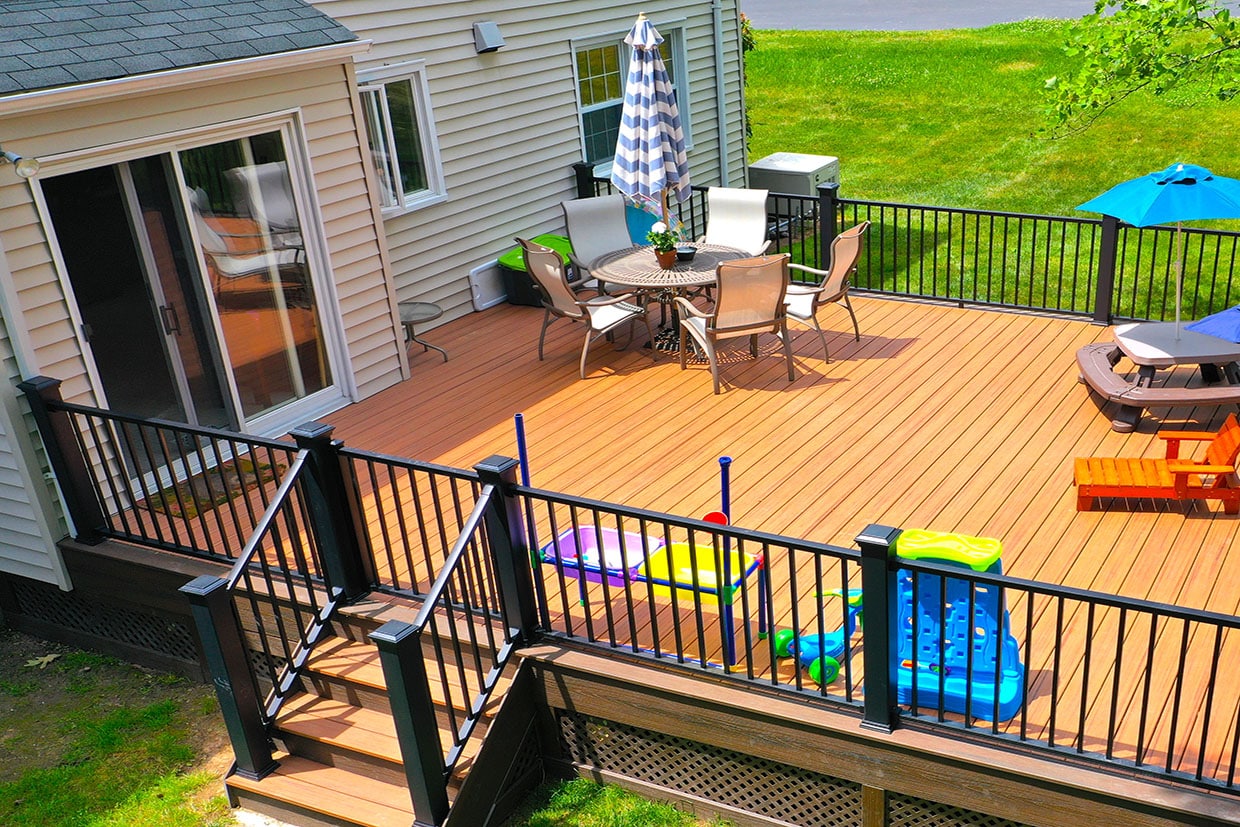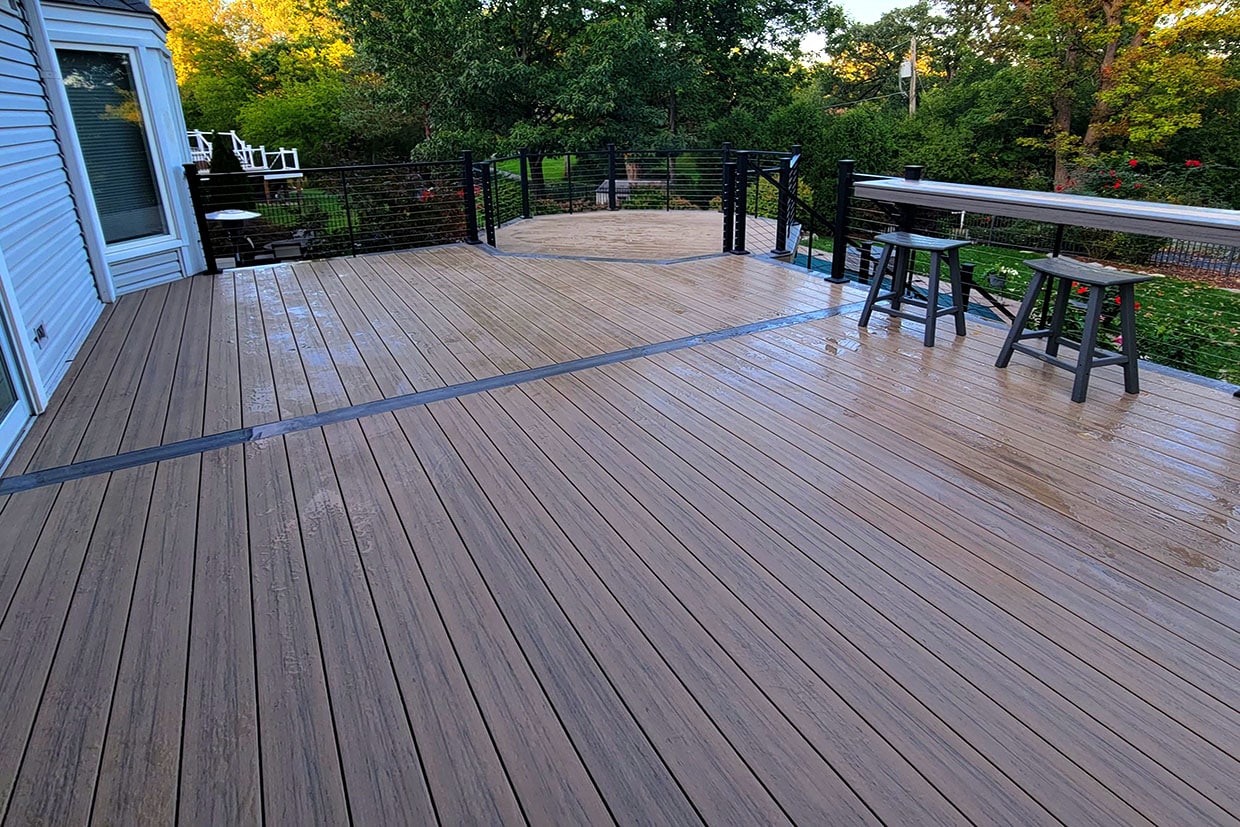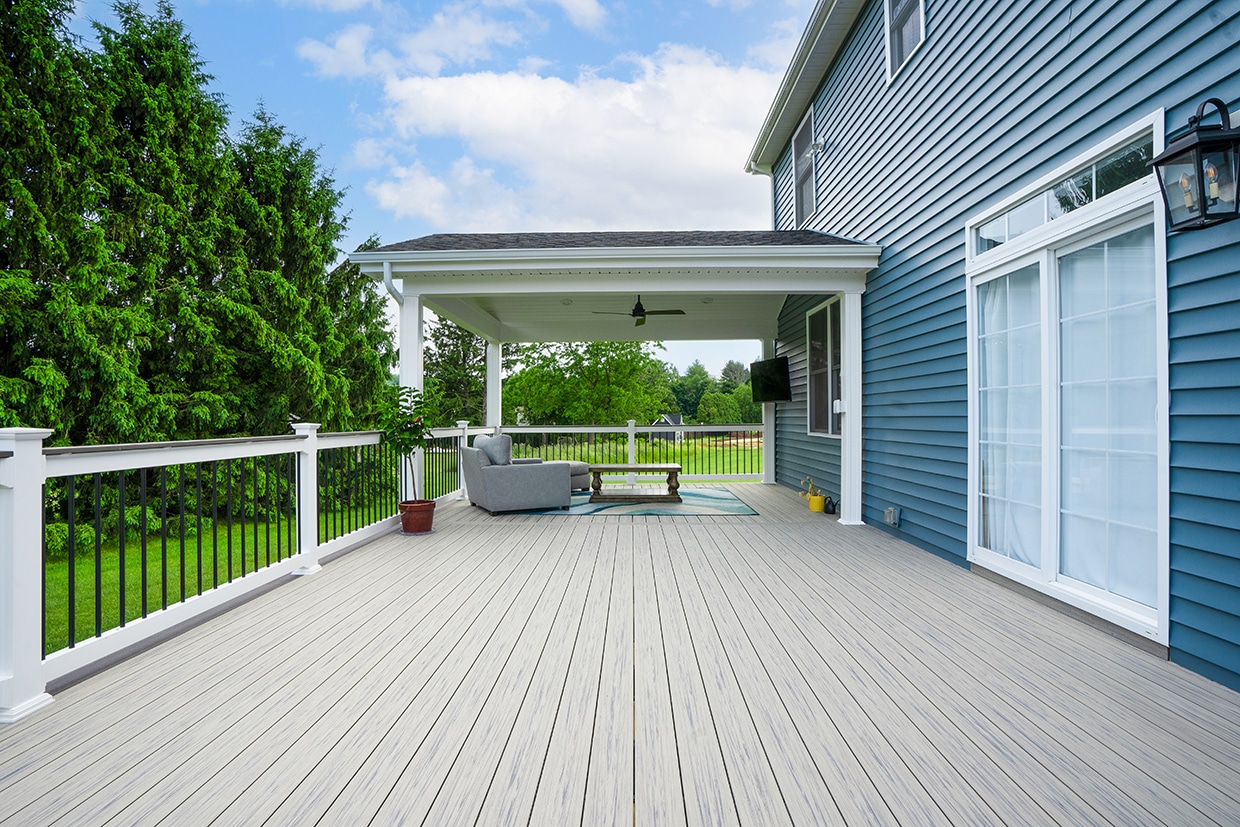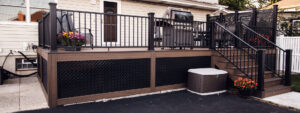Are you losing sleep trying to choose the best decking materials for your next deck project? There are so many great options to select from, and so many benefits of each material so it’s understandably a big decision. But if it’s keeping you up at night, there’s only one sensible solution— Contact Atlanta’s top deck builder, Royal Deck. We will take the guesswork out of deciding and help you pick the perfect deck material for your dream deck.
There are a number of factors that need to be considered when choosing the best deck materials. This blog post will walk you through the most common types of deck materials, their benefits and downfalls, and by the end of it, you’ll know which deck material is right for you, and your budget.
Most Popular Decking Material Options
Beginning a deck project starts with choosing the right materials. Decking materials come in a wide array of styles, colors, and makeup, so selecting the material that suits your needs and your budget is paramount in planning out a deck project. Here is a list of some of the best decking materials, their benefits and considerations:
Wood-Based Composite Decking
If you love the look of natural wood but don’t want the extensive maintenance, wood-based composite decking (WBC) is a popular alternative because of its blend of beauty, durability, and minimal upkeep. Composite decking is made from a blend of wood fibers and plastics, combining the best of both materials.
Types of Composite Decking:
- Capped Wood-Based Composite Decking: This version takes the core benefits of composite material and adds a protective polymer shell, or “cap,” on the outside. This cap provides added protection against moisture, fading, staining, and scratches, significantly extending the lifespan and preserving the overall look of the deck. Capped composites often come with extended warranties and a wider array of color and texture options, mimicking the look of natural wood more closely.
- Uncapped Wood-based Composite Decking: The original form of composite decking, uncapped, lacks the outer shell, making it more susceptible to staining, fading, and scratching. While improvements have been made over the years, uncapped composites generally require more care and are less resilient compared to their capped counterparts.
Pros and Cons of Wood-Based Composite Decking
Pros
- Durability: Composite decking is designed to resist fading, staining, scratching, and mold, making it an excellent choice for a long-lasting outdoor space.
- Low Maintenance: Unlike wood, composite decks require minimal upkeep. A simple cleaning with soap and water is generally all that’s needed to maintain their appearance over time.
- Aesthetic Variety: With a wide range of colors and textures available, wood-based composite decking can mimic the look of natural wood or offer unique hues that natural wood can’t, allowing for personalized looks.
- Sustainability: Many composite decking materials are made from recycled wood and plastic, reducing waste and utilizing resources more efficiently.
Cons
- Higher Upfront Cost: Composite decking materials can be more expensive initially than traditional wood options. However, the lower maintenance costs over time can offset this initial investment.
- Heat Retention: In direct sunlight, composite decks can become quite hot underfoot, which might be uncomfortable in warmer climates.
- Potential for Mildew and Mold: While less susceptible than wood, uncapped composite decking can still be prone to mildew and mold growth in damp conditions, requiring occasional cleaning to prevent buildup.
- Less Natural Feel: Despite advancements in texture and color variety, some homeowners may feel that composite decking lacks the natural feel and warmth of real wood.
Choosing a wood-based composite decking involves weighing these considerations against your priorities for aesthetics, durability, maintenance, and environmental impact. If you’d like to learn more about the versatility of this decking material, Royal Deck’s team would be happy to show you the variety of styles and colors of our commonly used composite decking.

Mineral-Based Composite Decking
Mineral-based composite decking or MBC, offers a cutting-edge alternative to traditional wood and wood-based composite decking materials. This innovative option combines the durability and strength of minerals with the versatility of composite technology creating a deck material that stands up to Atlanta’s elements with excellent resilience.
Characteristics of Mineral-Based Decking
- Enhanced Traction: Incorporating a vertical grain design, mineral-based composite decking like Deckorators Surestone™ mineral-based composite technology, offers improved traction, which is important for safety. This slip-resistant design ensures a safer surface during wet conditions, boasting a 34% increase in traction compared to standard deck materials.
- Superior Performance in Water and Ground Contact: Engineered for versatility, these decking materials are warranted for direct installation in ground or water environments. The unique composition virtually eliminates absorption, making it an ideal choice for spaces exposed to water or high humidity.
- Lightweight Yet Strong: The decking features a wood-like fiber structure that offers unmatched strength while being significantly lighter than traditional composites.
- Innovative Technology and Design: Mineral-based composite is designed to resist splintering, sagging, chalking, or cracking, ensuring a long-lasting, beautiful surface. It is also stain-resistant, and fade-resistant, plus reduces heat retention, making your deck more comfortable underfoot in sunny conditions.
Pros and Cons of Mineral-Based Composite Decking
Pros:
- Durability: Mineral-based composites are extremely durable, and resistant to rot, decay, and insect damage, making them an excellent long-term investment.
- Low Maintenance: Unlike wood decking, mineral-based composites require minimal upkeep. There’s no need for staining, sealing, or sanding, saving time and money over the deck’s lifespan.
- Sustainability: Many mineral-based composite products are made from recycled materials, offering an environmentally friendly decking option that reduces waste.
Cons:
- Cost: Initially, mineral-based composite decking can be more expensive than wood. However, its longevity and low maintenance requirements offset the upfront investment over time.
- Weight: Some mineral-based composites are heavier than wood or traditional composites, which may require additional structural support.
- Limited Looks: While technology has advanced in replicating natural textures, some homeowners may not find the specific aesthetic they are looking for in a mineral-based composite.
A mineral-based composite is a perfect option for homeowners prioritizing longevity, safety, and sustainability. If you’re unsure if mineral-based composite is the best decking material for you, reach out to Royal Deck and we can walk you through our MBC decking options.

PVC Decking
PVC decking stands out in the decking material spectrum, distinguished by its synthetic construction. Made entirely from polyvinyl chloride, PVC decking is designed for homeowners seeking a blend of high durability, low maintenance, and aesthetic flexibility.
Characteristics of PVC Decking
- High Durability: PVC decking is known for its exceptional resistance to the elements. Unlike wood and some composites, PVC is impervious to rot, decay, and insect infestations, thanks to its all-plastic composition. This makes it an ideal choice for regions with high moisture levels or those prone to pest problems.
- Moisture Resistance: The non-porous nature of PVC decking means it doesn’t absorb water, thereby eliminating concerns about mold and mildew growth common in other materials. This moisture resistance also prevents the warping, swelling, or splintering often seen in wood decking.
- Low Maintenance: One of the most appealing aspects of PVC decking is its ease of care. Unlike natural wood, PVC doesn’t require staining, painting, or sealing to maintain its appearance and functionality. Simple cleaning with soap and water is generally sufficient to keep it looking new.
Pros and Cons of PVC Decking
Pros
- Durability and Longevity: Resists weathering, rot, decay, and insect damage, making it a long-lasting decking option.
- Low Maintenance: Requires no staining, painting, or sealing, with cleaning needs minimal and straightforward.
- Moisture Resistance: Offers excellent protection against moisture, preventing mold and mildew growth.
- Aesthetics: Available in a range of colors and textures, including options that resemble natural wood.
Cons
- Environmental Impact: Making PVC involves non-renewable petroleum products, and recyclability may be limited compared to other decking materials.
- Higher Initial Cost: Generally more expensive upfront than wood decking, though long-term savings on maintenance can offset this.
- Potential for Heat Retention: Like some composites, PVC decking can become quite hot under direct sunlight, which may be uncomfortable in warmer climates.
PVC decking offers a mix of durability, easy maintenance, and aesthetic variety, making it an attractive option for many homeowners. If you would like to know more about PVC, contact Royal Deck and we can help guide you through our decking options.
Choosing the Best Decking Material for Your Project
Choosing the best decking material can significantly impact the look, durability, and maintenance of your outdoor space. To simplify your decision-making process consider some of the following questions:
- Are you looking for a very low-maintenance option? PVC stands out as it is highly durable and requires just a simple cleaning to keep it looking like new.
- Is the look of natural wood important to you? WBC Decking closely mimics the look and feel of real wood offering a variety of colors and textures that replicate natural wood grains.
- Is unique aesthetics something you prioritize? MBC offers a modern, sophisticated look with performance to match.
- Is having a wide variety of colors and textures to choose from important? PVC decking provides a broad range of options, including those that mimic natural wood and unique hues that are not found in wood products.
- Are sustainable materials with lower long-term costs a priority? WBC and MBC decking are made from recycled materials. Both are cost-effective due to their durability and low maintenance requirements over their lifetime.
These questions can guide you toward the right material for your deck, but consulting with the decking professional at Royal Deck can provide you with customized advice and insights specific to your deck project’s requirements. Don’t hesitate to reach out today!
Royal Deck: Building Excellence With The Best Decking Materials
Are you ready to transform your Atlanta outdoor space with the perfect deck? Choosing the right decking material is key to building a beautiful, long-lasting deck. Whether you’re drawn to the durability and low maintenance of composite materials, or the advanced technology of PVC decking, we’re here to help you make an informed decision that fits your lifestyle and budget.
You’re not alone in making this decision! Contact Royal Deck today for expert guidance so we can start creating the outdoor living space of your dreams. Let’s build something beautiful together.









